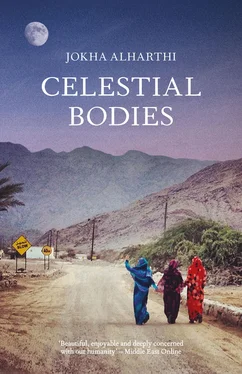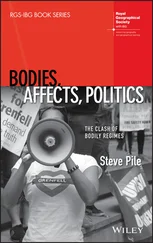I didn’t hear that question about what we were having for dinner ever again, until I grew up and travelled. Then, I discovered that people would talk for hours about their food. Television ads showing open mouths happily consuming various dishes shocked me. Around me, people asked each other in all simplicity, What did you have to eat? Or, What are you going to have for dinner? My son Salim returns from college and before he says Good evening he asks, What’s for supper? If his mother’s response doesn’t please him he turns around and leaves the house, heading for the pizza takeout or McDonald’s.
As soon as her father left the room Khawla hurried to the door, pulling it tightly shut as it had been before. She stood leaning against the window, breathing heavily. It took her a moment to notice that the rain was coming down hard, and then she sat down on the floor, her face toward where Mecca would be. Her mother had always said that your prayers are especially powerful when rain is coming down. Lifting her hands high, she repeated the same supplication that she uttered at the end of every set of prayers, and whenever it rained, and when she was fasting. O Lord, bring Nasir back to me. Bring him back before I die of grief.
She rested her head on the open palm of her right hand and curled up in the foetal position. She loved listening to the sound of the rain, and she loved even more running beneath it and feeling the wetness seeping all the way into the roots of her hair. Just then, though, she knew she wouldn’t dare go anywhere near the sitting room if she were to go out into the rain first, and there was no real way to hide. One way or another, her mother would catch sight of her. If she were to go outside, it would even be difficult to slip by unnoticed into the girls’ room to dry herself off before someone saw her. She turned onto her back and stared at the ceiling, the white fan, and the neon strip, her mind on Nasir.
When they were little, they had played together every afternoon with the other neighbourhood children. They formed teams: one from the eastern quarter and the other from the western quarter, each team chasing the other through all the little streets and dead-end alleys of al-Awafi. Khawla always tried to avoid Zayid because he was forever catching hold of her braids and yanking them. She stayed close to Nasir wherever he went. Most often, the two of them slipped away from the collective tag game. Nasir would dart over to the muezzin’s house to pluck a red rose from the lone rosebush in the courtyard. He would poke it into her braid but he always forgot her words of caution: Take the thorn off the stem first! More than once a rose from the muezzin’s house scarred her forehead.
Khawla turned onto her side, laying her head on her left palm, with the one picture on the wall staring at her. Mayya had hung it there before she left this room to get married. A thin gilt frame enclosed a broad pasture, the green grass extending into the distance and massed clouds overhead. Of course there was no such thing in the world! Mayya always protested that there was, in England. All of these enormous green spaces? How could that possibly be? The biggest expanse of green Khawla had ever seen was their farm, where she’d hid the envelope containing Nasir’s picture by shoving it into the split in the palm-tree trunk.
Her memory of that day was vivid. As the light began to fade, the group of boys and girls were tiring of their games, and most headed home. Nura proposed another game that they sometimes played: Names and Jobs. Each child wrote out a list of names, numbered, and likewise of jobs. Then each chose a number, and that would yield the name of a future husband or wife, and a job. When Abd al-Rahman, Judge Yusuf’s son, chose number twenty, Khawla was the name that came up. Nasir said, Change your number! Abd al-Rahman refused. Nasir got angry and fought with him, leaving his nose bloody, all the while yelling, Khawla is my cousin and my wife, mine, we are engaged!
How old had she been when that happened? She could not have been more than nine. And Nasir? Perhaps twelve, or maybe even thirteen. She remembered how he had led her by the hand to his home where her uncle’s widow offered her dates in clarified butter, and how, before she left, he had pressed the envelope into her hand. Inside was his picture, which he had torn off his school certificate. She remembered, too, how her mother beat her when she returned so late, darkness already filling the world around her.
Khawla turned onto her back, interlocking her fingers beneath her neck. She did not much like this glossy milky blue paint that the room had been covered in but even so, it was a room where she could feel at ease. Mayya was no longer a little girl when her mother began talking about adding a special room for the sisters, one that did not open onto the other rooms and that especially remained apart from the sitting room. Their home was madkhul as her mother always said — a house people flocked to, a house that was always full of others. Women were always coming and going, and especially, sitting and visiting in the big room. These girls were getting older, their womanhood was beginning to blossom, and their mother wanted to keep them invisible to her visitors’ ever-curious eyes. Anyway, their mother knew, it simply would not do for these growing girls to hear the conversations the older women were always having, which Salima referred to as women’s foolishness.
Khawla and her sisters welcomed the idea. A room at the other end of the courtyard would mean Asma could be alone with her books, as she preferred, and Khawla with her mirror, as she liked. As for Mayya, usually she did her sewing in the sitting room, anyway, except when it was filled with women and her mother signalled that she must leave. She must go to the girls’ room. Khawla sighed. That was before Mayya had gotten married. Since then she had begun to share in the women’s gatherings, bringing her scrawny little one with her.
A large red carpet covered much of the room. Lined up against one side of the wall stood three wooden wardrobes, one apiece. Her mother had gone to the carpenter to order them specially, choosing the dimensions and the decorative carvings for them herself. That is why Khawla didn’t have a wardrobe with a mirror the height of the door. In fact, the only mirror she had was this small rectangle in its thin wood frame hanging on the wall facing the wardrobes. She had to stand tall to comb her hair or to apply the new lipstick that Mayya had managed to get for her in Muscat. On their wedding night, what would Nasir say when he saw how long and soft her hair was now?
Asma’s books spilled over from her shelves onto Mayya’s shelves now, because she had so many of these books. Khawla was astonished at how oblivious Asma seemed to the awful boredom these ancient books induced. The only books Khawla could bear to read were translations of Harlequin Romances, books that Asma scorned, refusing to be seen holding them for even a few moments.
Her friend Nura had discovered these novels on a visit to her relatives in Muscat. She brought a few to Khawla, who was soon addicted. These books were beautiful stories about love and they always took place in forests or green pastures or verdant plains. The heroine always had a delicate prettiness and the hero was always strong and handsome and noble. Lying in bed before she dropped off to sleep, Khawla would imagine herself with Nasir on that remote and lush island she had read about in one of these novels, the two of them surrounded by animals and birds and the magical sounds of nature. Nasir’s photograph remained in her wardrobe, concealed among the folds of her clothes, for several months, before Nura warned her that her mother might stumble across it. They agreed that the best spot for it was the biggest palm-tree trunk on her father’s farm. There the picture lay stuffed inside its envelope in the tree trunk, hidden by the palm fronds. Khawla made her pilgrimages to that tree throughout the years of adolescence. That day, when her uncle’s widow disappeared into the kitchen to get the dates and samna, Nasir grabbed her hand and said, Don’t ever marry Abd al-Rahman! You are engaged to me. I am the son of your uncle, after all, not him.
Читать дальше












